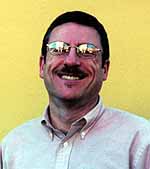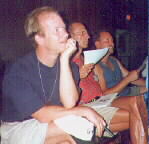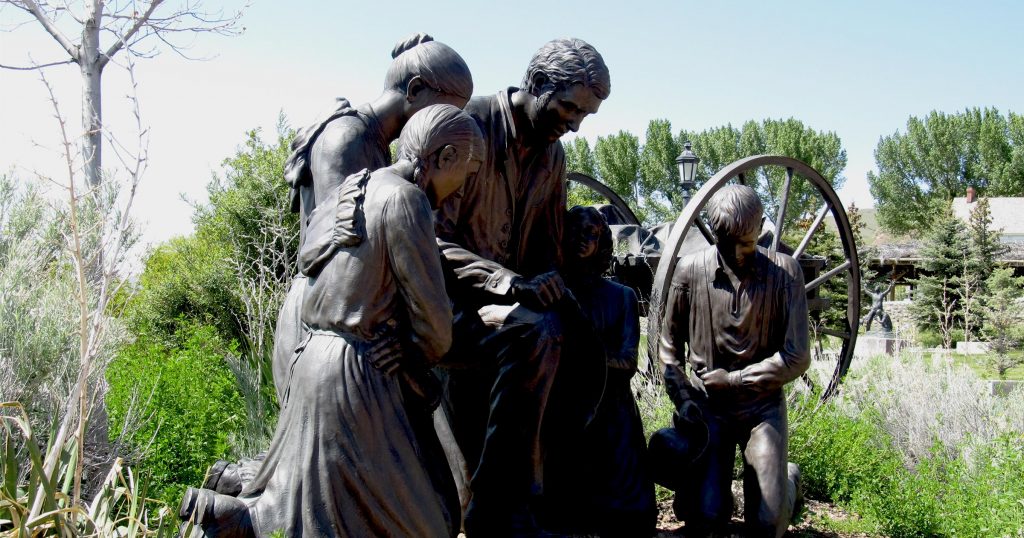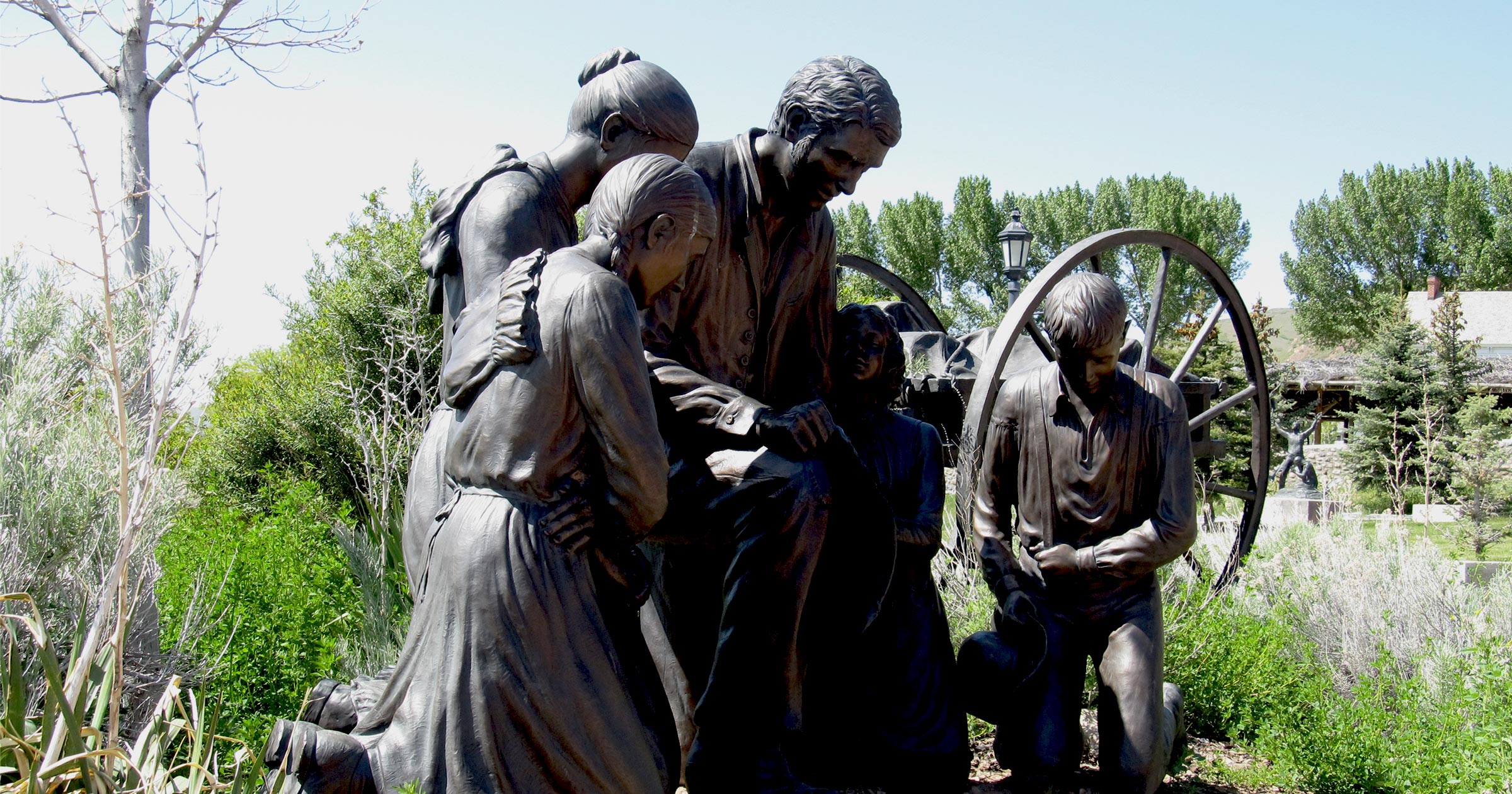Come, Come Ye Saints
by Olin Thomas
Talk given at the Affirmation Conference, Salt Lake City, 1997.
 The incident I am about to speak of occurred during a crossing of the plains by Mormon pioneers in 1852. It was recorded by Oscar Winters, later to become Heber J. Grant’s father-in-law.
The incident I am about to speak of occurred during a crossing of the plains by Mormon pioneers in 1852. It was recorded by Oscar Winters, later to become Heber J. Grant’s father-in-law.
“One night, as we were making camp, we noticed one of our brethren had not arrived. A volunteer party was immediately organized to return and see if anything had happened to him. Just as we were about to start, we saw the missing brother coming in the distance. When he arrived, he said he had been quite sick. So some of us unyoked his oxen and attended to his part of the camp duties. After supper, he sat down before the campfire on a large rock, and sang in a very faint but plaintive and sweet voice, the hymn, “Come, Come Ye Saints.” It was a rule of the camp that whenever anybody started this hymn all the camp should join. But for some reason this evening nobody joined him. He sang the hymn alone. When he had finished, I doubt if there was a single dry eye in the camp. The next morning we noticed that he was not yoking up his cattle. We went to his wagon and found that he had died during the night. We dug a shallow grave, and after we had covered his body with the earth we rolled the large stone to the head of the grave to mark it, the stone on which he had been sitting the night before when he sang: “‘And should we die before our journey’s through, Happy Day! All is well! We then are free from toil and sorrow too, With the just we shall dwell. But if our lives are spared again, to see the Saints their rest obtain, Oh how we’ll make this chorus swell—all is well! All is well!‘”
 When I first read this story, it occurred to me how similar the emotions it evoked were to those I felt when my first partner Mark died. He and I were also on a journey—also long and with an uncertain future. It was the path towards acceptance by our families, co-workers and our society. Whereas the early Mormons were literally driven from their homes through physical violence or threat of it, we gay and lesbian people more often are driven away from our families or friends through a conspiracy of silence, a refusal to face or deal with the fact of our homosexuality. Mark and I were accepted by his family, and most of mine, only by pretending we weren’t gay. How similar this is to the stories of early Mormons, accepted by their families only if they denied what they knew to be true. As Mark lay near death, with his still unaccepting family gathered ’round, I could not help but feel sad and bitter that he had never reached his destination on that journey towards acceptance, just as that pioneer man never reached his destination of Utah. Why would that unfortunate Mormon pioneer sing “Come, Come Ye Saints,” as he felt his journey ending? And why would I, a gay Mormon 150 years later, be reminded of my lover’s passing upon reading this story? The answer is in the lyrics and story of “Come, Come Ye Saints.”
When I first read this story, it occurred to me how similar the emotions it evoked were to those I felt when my first partner Mark died. He and I were also on a journey—also long and with an uncertain future. It was the path towards acceptance by our families, co-workers and our society. Whereas the early Mormons were literally driven from their homes through physical violence or threat of it, we gay and lesbian people more often are driven away from our families or friends through a conspiracy of silence, a refusal to face or deal with the fact of our homosexuality. Mark and I were accepted by his family, and most of mine, only by pretending we weren’t gay. How similar this is to the stories of early Mormons, accepted by their families only if they denied what they knew to be true. As Mark lay near death, with his still unaccepting family gathered ’round, I could not help but feel sad and bitter that he had never reached his destination on that journey towards acceptance, just as that pioneer man never reached his destination of Utah. Why would that unfortunate Mormon pioneer sing “Come, Come Ye Saints,” as he felt his journey ending? And why would I, a gay Mormon 150 years later, be reminded of my lover’s passing upon reading this story? The answer is in the lyrics and story of “Come, Come Ye Saints.”
“Come, Come Ye Saints” was written in April of 1846 during the journey between Nauvoo and Winter Quarters in the Iowa/Missouri border by William Clayton. This was the harshest time yet for the members of the young church. For the heresy of proclaiming their belief that God had sent more of his word to the world, they were attacked on every side. Eventually, the only viable direction for them appeared to be forward, to a new place where peace and freedom to be themselves could be found. I submit to you that the gay and lesbian community of the 1990s is in much the same position as the Mormons were in the 1840s. For the first time in history, large numbers of gays and lesbians have dared to proclaim their belief that God made them just as they are and that their knowledge is truth, not sin or heresy. And society has responded towards gays much as society responded toward Mormons a century and a half ago.
How shall we reply? Where shall we seek comfort? There is power and comfort to be found in music. Songs describing the mission and beliefs of groups have often become symbols to rally behind and encourage the faithful. The hymn “Come, Come Ye Saints” became the great anthem of the Mormon pioneer exodus. “The Battle Hymn of the Republic” became an anthem for troops of the Union in the war between the States. The song “We Shall Overcome” lifted the spirits of black Americans during the Civil Rights movement. No one song has achieved such status for the gay rights movement, but we gay and lesbian Mormons can take a lesson from our own past and embrace anew the hymn which served the Pioneers so well.
“Come, come ye Saints, no toil nor labor fear.” I wonder would I have had the courage to join the church in the 1830’s? Or would fear of the hardship and effort have made me compromise and remain safe in a mainstream church? Today I am proudly and bravely open about my true self—so long as the audience is friendly, at least harmless. Or to the extent that I won’t lose an important relationship or endanger my job. What do I fear? The toil of and labor of starting over, of building new relationships or starting a new job (how could I have crossed the plains when I can’t leave my own cocoon)? Go onward on your personal journeys, but with Joy wend your way—for a lighter heart means a lighter step—and you won’t be stuck in the mud so much. I constantly remind myself I can get there grumpy or I can let go of the anger and go in peace. I will end up in the same place perhaps, but what I learn along the way will be quite different.
Though hard to you this journey may appear, and it will appear hard, sometimes as more than a human heart can bear, grace shall be as your day. Too often we make the mistake of trying to carry the burden of our worries and responsibilities alone and in silence. Surrender your need to control the situation, accept God’s grace and live each day as best you can. You know that tomorrow and its hardships will soon come, but so will another day’s strength, and you’ll be one day wiser. Tomorrow’s journey appears harder than today’s path, yet they are one and the same. Tis better far for us to strive our useless cares from us to drive. Oh, there are things we need to care about: loving our friends, respecting our communities. But it is useless to appease either friends or enemies or to sacrifice ourselves to fit in the group. To thine own self be true, do this and your heart will swell with joy and you’ll know at all is well.
When Mark died, I naturally mourned his loss, but I also mourned for myself, trapped in a strange place, a widower in my own mind, but not recognized as such by the majority of people I had to deal with. I thought my lot was very hard indeed. But I came to see it was no different than the Mormon pioneer who lost a wife or husband to illness on the trail West. If your ancestors had given up, as I had wanted to, whenever they lost a loved one, we’d still be a colony of another nation. There is something bigger than any one of us to which we owe not blind obedience but loyal service, for we are all dependent on each other, and all diminished by the loss of any, whether we see that or admit it. It would be hypocritical for me to give up on all humankind because of the uncaring of a relative few.
Why should we think to earn a great reward, if we now shun the fight? We are moving, stopping now will not necessarily protect any gains made thus far. Remember, the church is headquartered in Salt Lake, not on the banks of the Missouri. Not asking and not telling is no reward, it is a polite threat veiled as a concession. A life of chastity is not purity, it is pure misery, a pious attempt to live to ideals set for another. “Gird up your loins and fresh courage take, for our God will never us forsake.” Listen to what God is truly telling you and only you, and then you will have a better plan of salvation than any man can create for you.
The Mormon pioneers were looking for a place God had prepared for them, far away in the West. In those days the West was the frontier, beyond the edge of the known. As gay pioneers, we aren’t looking for a geographical place, but a philosophical place beyond the known edge of society in the frontier of the human spirit. A place where none shall come to hurt or make afraid. Where each of God’s children is loved and respected and all are judged by the joy we bring others, not how we find joy ourselves. Is this an extravagant dream? I think not. Who among the weary pioneers of 1847 would have dared envision the success and strength of the Church today, or the position of respect and sometimes envy it has earned? All logic would tell us the early church should have been crushed beneath the incredible pressure brought to bear against it. But it was instead tempered by the fire, gaining strength from its trials. Let us now gain purpose and strength from the pressure upon us as we continue on our journey to acceptance. And should we die before our journey’s through, we can still rejoice in lives well lived. Our efforts are not in vain. The path we blaze guides and aids those who come next, just as the road ahead of us was made easier by those who have gone before. But if in our lives we see our gay and lesbian brothers and sisters obtain the rest they so richly deserve, then we will have something to sing about, and we will make this chorus swell—all is well, all is well!
Olin Thomas
Washington DC Chapter
(The fifth verse of Come, Come Ye Saints, by Sikoki Layton)
Come, come ye gays
and lesbians rejoice!
Join in song; hearts will tell.
We stand as one
and raise a mighty voice!
In the light we shall dwell.
As we share with pride
this message true:
We’re God’s gay children
and we’re loved too!
Affirm this truth and spirits swell-
All is well, all is well!

